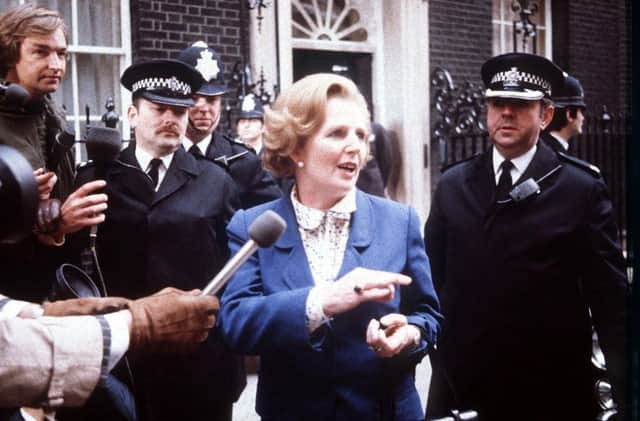40 years on: How Thatcher sewed seeds of Brexit


A strike by technicians at the BBC had blacked out the whole country in the days before the holiday, and a separate dispute at Yorkshire TV had taken out the region’s ITV service, too.
Meanwhile, an overtime ban by lorry drivers in support of a 40 per cent pay rise had disrupted oil supplies. As some of the worst snow since 1963 fell outside, the climate in Downing Street was glacial.
Advertisement
Hide AdAdvertisement
Hide AdThe simmering anger that blew the lid off Jim Callaghan’s pay cap exactly 40 years ago was the last gasp of a Britain that had – literally in the case of the freight industry – reached the end of the road.
But the anniversary of Margaret Thatcher’s election, which will be marked in May, will see no consensus on whether the turn the country took next was the right one, the author of a book on her years in office said.
“There will never be agreement on the nature of her legacy,” said Prof Brendan Evans of Huddersfield University, who interviewed many of her key aides for his 1999 volume, Thatcherism and British Politics.
“I wouldn’t say the nation was deeply divided, but there are those who regard the Thatcher years as a fantastic time of growth, achievement and national pride, in which threats to civil order were destroyed, and others who think it was a destructive era in which a lot of people’s lives were wrecked.”
Advertisement
Hide AdAdvertisement
Hide AdThe election of May 3, 1979, of the nation’s first female Prime Minister was a turning point even before the country got wind of her policies.
But it also sowed the first seeds of the Brexit debate playing out today, Prof Evans said.
“A consensus had prevailed in British politics from 1945 to the 1970s, and that was destroyed by Thatcher, for good or ill,” he said.
“In today’s political discourse, one of the worst insults that Labour can throw at Theresa May is that she’s behaving like Margaret Thatcher.”
Advertisement
Hide AdAdvertisement
Hide AdBut in 1979, it was her charisma that struck a chord with voters, he said.
“There was intense negativism towards the winter of discontent and towards militant trade unionism, and she came across as a very strong personality. I think people were voting for that rather than for her policies.”
The nature of the politics that Thatcher would pursue over the next 11-and-a-half years may not even have been clear in her own mind at that time, Prof Evans said.
“Studying the archives, I think some policies were worked out but many others were just invented in an ad hoc way as she went along.
Advertisement
Hide AdAdvertisement
Hide Ad“And she didn’t pursue the policies vigorously at the outset. She tested public opinion and was cautious about making radical changes. The NHS she wouldn’t touch.”
But one area in which her single-mindedness took root within her party was her attitude to Europe.
“Her Bruges speech of 1988, when she condemned the EU and said Britain would resist further integration with Europe, awoke a dispute in the Conservative Party that had been more or less resolved, and the great upsurge of Brexit sentiment in the party can be traced to that speech.
“In her final appearance in the Commons in 1990, she made another speech in which she said people wanted to unite us into Europe and get rid of the pound, and she said, ‘no, no, no’ to all of them.
“Those leading Conservatives I’ve interviewed for the book say it’s entirely down to her that the whole situation has emerged as it is now.”
Tomorrow: 80 years since the Second World War.